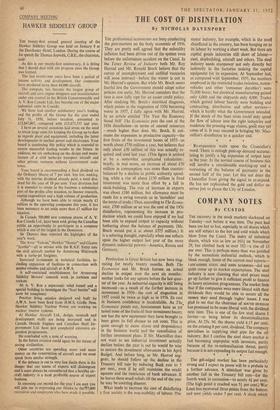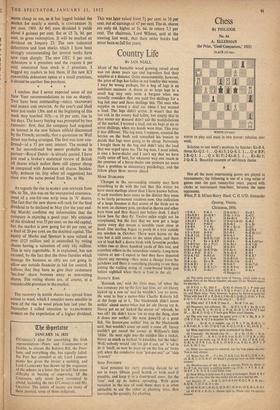COMPANY NOTES
By CUSTOS THE recovery in the stock markets slackened on Tuesday—not before it was time. The pace had been too hot to last, especially in oil shares which are still subject to the hot and cold winds which blow from the Canal. The index of industrial shares, which was as low as 161f on November 29, has climbed back to over 182—a rise of 13 per cent. This is perhaps more than was justified by the immediate industrial outlook, which is bleak enough. Some of the current steel reports— LANCASHIRE STEEL and JOHN SUMMERS—IM not quite come up to market expectations. The steel industry is now claiming that steel prices must go up farther to give it sufficient profit to finance its heavy extension programmes. The market feels that if the companies were more liberal with their dividends they would be able to secure all the money they need through 'rights' issues. I was glad to see that the chairman of SOUTH DURHAM has promised to be more liberal with the dividend next time. This is one of the few steel shares I favour—as being below its denationalisation price. At 25s. 9d, the shares yield 6.15 per cent. on the existing 8 per cent. dividend. The company specialises in supplying steel pipe for the oil industry. But I confess the steel share market is fast becoming unpopular with investors, partly because of the re-nationalisation threat, partly because it is not expanding its output fast enough.
The gilt-edged market has been particularly strong and I expect its pause will be a prelude to a further advance. A stimulant was given by another fall in the Treasury bill rate—for the fourth week in succession—to nearly 4f per cent. (The high point it reached was 51 per cent.) War Loan has recovered three points from the bottom and now yields under 5 per cent. A stock which seems cheap to me, as it has lagged behind the market for nearly a month, is CONVERSION 31 per cent, 1969. At 84f cum dividend it yields about 4 guineas per cent. flat or £5 7s. 9d. per cent. to gross redemption. It will be marked ex dividend on Janpary 23. The new industrial debentures and loan stocks which I have been strongly recommending for several weeks have now risen sharply. The new GEC 6 per cent. debenture is 4 premium and the FISONS 6 per cent. unsecured loan stock is 5 premium. I begged my readers to buy them. If the new ICI convertible debenture opens at a small premium, it should be another fine purchase.
* *
I confess that I never expected some of my New Year recommendations to rise so sharply. Two have been outstanding—SHELL TRANSPORT and MARKS AND SPENCER, At the year's end Shell were just under 150s. and at the beginning of this week they touched 165s.—a 10 per cent. rise in ten days. The heavy buying was prompted by two rumours: first, that the company had acquired an interest in the new Sahara oilfield discovered by the French; secondly, that a quotation on Wall Street was being arranged. The first was later con- firmed—at a 35 per cent, interest. The second is so far unconfirmed but seems probable as its partner—Royal Dutch—is already quoted. I have just read a broker's statistical review of British oil shares which makes them still appear cheap as compared with American oil shares. Inciden- tally, BURMAFI OIL (my other oil suggestion) has risen over the same period from 80s. to 90s.
As regards the rise in MARKS AND SPENCER from 60s. to 70s., this was on the unexpected announce- ment of a one-for-one scrip issue in `A' shares. The fact that the new shares will rank for the final dividencito be declared in May (for the year end- ing March) confirms my information that the company is enjoying a good year. My estimate of the dividend was 55 per cent. on the old capital, but the market is now going for 60 per cent, or a final of 20 per cent. on the doubled capital. The equity of Marks and Spencer is now valued at over £125 million and is controlled by voting shares having a valuation of only £41 million. This is very regrettable. It is explained, but not excused, by the fact that the three families which manage the business so ably are not going to allow any outside financier to bid for control. It follows that they have to give their customary 1 ix-free' share bonuses away in non-voting shares. The voting shares are, of course, at a considerable premium in the market.
* * *
The recovery in, textile shares has spread from cotton to wool, which I consider more sensible in view of the rise in wool prices late last year. In November I called attention to ILLINGWORTH MoitRis on the expectation of a higher dividend. This was later raised from 71- per cent. to 10 per cent. out of earnings of 47 per cent. The 4s. shares are only 6d. higher at Ss. 6d. to return 7.3 per cent. The chairman, Lord Wilmot, said at the meeting last week, that their order books had never been so full for years.



































 Previous page
Previous page